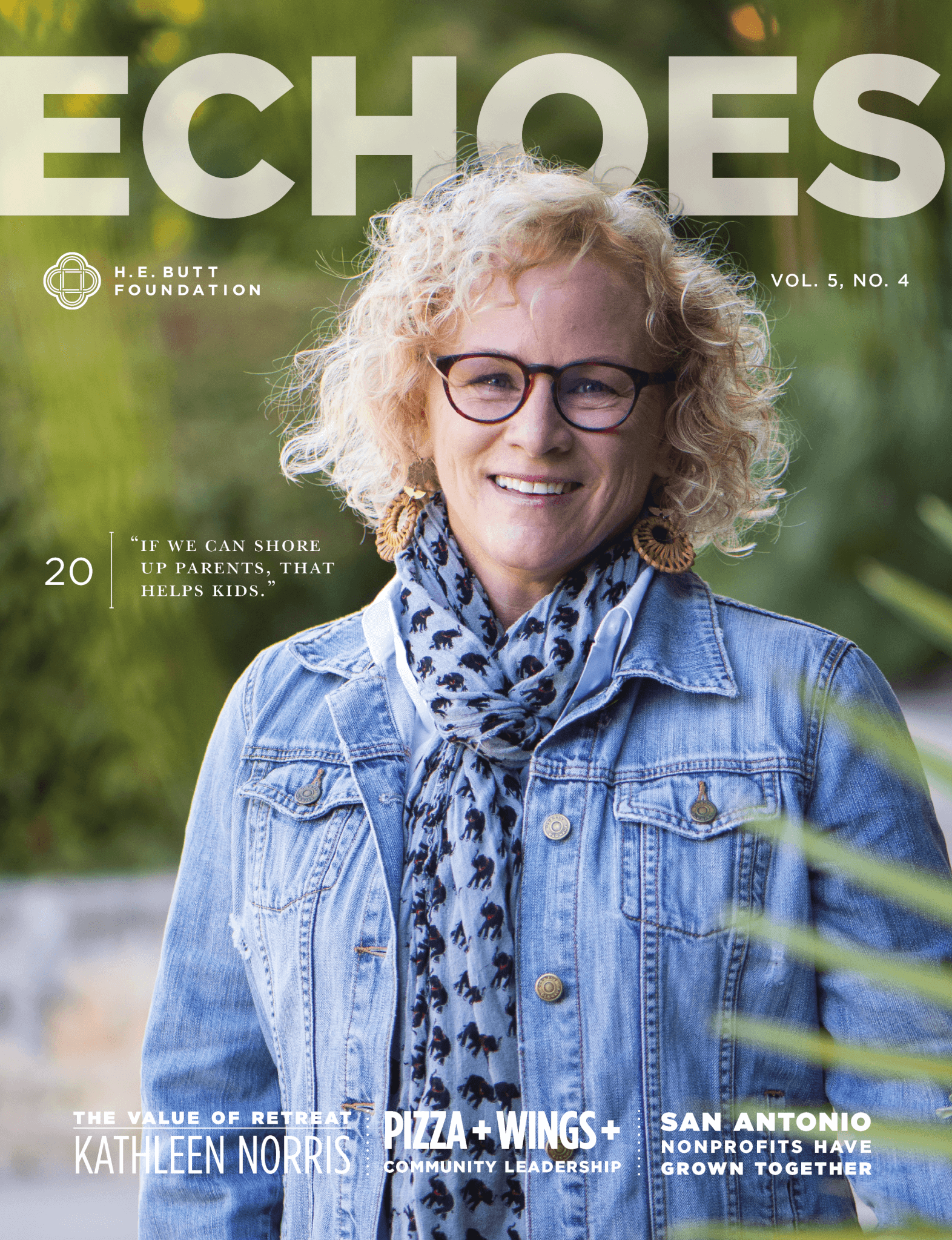

After Pastor Ronald Glover’s mother was diagnosed with dementia, he began studying the mental affliction and sought ways to help her and his family.
So, when the H. E. Butt Foundation presented the chance for his church to participate in its Faith and Mental Wellness Cohort Program in 2019, Glover eagerly joined.
“Hey, I’m not in this by myself,” he said. “A lot of people don’t like to talk about these kinds of things. There needs to be an awareness.”
Fewer than one-third of people asked in a 2018 H. E. Butt Foundation survey said they can regularly talk with someone in their congregation about their personal problems or concerns. Even fewer said someone is there to help them find solutions to their biblical questions.
The cohort, made up of eight San Antonio churches, aims to develop better ways to reach people and provide them with the support and resources they need.
The H. E. Butt Foundation has always strived to help those struggling with mental health challenges. One of the current endeavors started in 2018 when the foundation partnered with the Texas nonprofit Meadows Mental Health Policy Institute.
Together, the two compiled a comprehensive list of mental health initiatives and resources available. Then, the foundation wanted to learn where places of faith stood in addressing mental wellness issues, so it could help equip them for mental health ministry.
The foundation teamed up with the University of Texas-San Antonio, and college researchers surveyed 13 congregations in 2019, revealing that many congregants are satisfied with their lives and relationships within the church, but some still struggle with anxiety and depression. Most knew about counseling services offered, and not one reported being discouraged from seeking professional help.
“Healing happens best in the community setting,” said Perri Rosheger, the foundation’s vice president of community engagement and communications. “They can be spaces of great support, taking strides in the right direction with mental health.”
Still, barriers remained, according to the surveys. Why aren’t congregants seeking help, even if they knew it was there?
Rosheger points to the fear of being publicly vulnerable, of wanting to appear like you’re OK even when you’re not. It’s a different dynamic than sharing a physical challenge, such as a cancer treatment, which can be a lot easier to broadcast, she said. On the flip side, church leaders are not clinicians, and they may fear delving too deep into any issue.
“For everyone to be successful, we have to break down the performance expectation that’s rampant in Christian circles,” Rosheger said.
That’s the cohort’s role.
After the UTSA surveys, the churches were invited to be part of the Faith and Mental Wellness Cohort Program, a two-year commitment to figuring out how to address mental wellness. Eight churches joined, representing varying denominations and different areas of San Antonio.
Since February, churches in the cohort have been sharing their approaches to mental wellness within their congregations and surrounding communities. The group is meeting virtually each month because of the COVID-19 pandemic.
“This hasn’t been done much around the country as far as cohort knowledge,” said Mark Carmona, the mental health cohort leader. “This body of knowledge will be important.”
Leaders are gleaning tips and advice from each other, no matter if this was a brand-new subject for them or if their congregation had already taken a few steps to address it.
Before joining the cohort, St. Mark’s Episcopal launched Resilience Nights, events introducing mental health topics to its youth and parents. Multiple suicides in the community affected the church’s youth and prompted the meetings. One of the church’s Resilience Nights featured a movie screening that drew a full crowd. It was clear that congregants wanted to talk.
“We had youth and families that were impacted by those losses,” said Rev. Ann Benton Fraser. “I don’t think we knew how widespread that need was until that movie night. There was a significant group of people who know they want their community of faith to be a place of support.”
Whether the church is like St. Mark’s Episcopal with more than 600 attending households or it’s a smaller congregation like Pastor Glover’s Temple Missionary Baptist with 100 members, relationships are key. Pastor Glover lets his congregation know he’s there for them; everyone has his phone number. And if he can’t help, he will find someone who can. For example, for a marital dilemma, he’d connect the wife with someone who could better relate, like another female congregant.
That’s an important approach for any church to emulate. Sometimes, solutions can be found within the church family.
“It’s our job as Christians to care,” Pastor Glover said.
St. Mark’s suggested another practice to cohort members: weekly check-up phone calls. That’s proven especially valuable during a pandemic when congregants are isolated from one another.
“I think this [cohort] approach is a good one,” Carmona said. “There’s shared learning that goes on; they are learning from each other and borrowing ideas. There was no one group that can go do it alone. What I see on a larger scale is nontraditional organizations being part of the continuum of care.”
Being a part of the continuum of care involves planning. As the cohort continues to meet through August 2021, church leadership will work on projects catered to their congregations with the ultimate goal of staying involved, connected, and supportive.
“There’s something that gives courage in knowing we’re not alone,” Rev. Fraser said. “We want to build our own capacity to be present, to listen without judgment, and have resources of knowledge, and to accept people where we encounter them.”
To aid in the projects, the foundation is providing a $5,000 stipend to each cohort church along with access to resources and expertise. The goal is to create a community of faith leaders who are not only helping their congregations, but also each other. This model can serve others in San Antonio and beyond, highlighting the pivotal role churches provide.
“What we’re doing as a Christian congregation is about love, and we have to keep coming back to that,” Rev. Fraser said.
Hilary Monford has been partnering with Laity Lodge Family Camp to offer accessible counseling and therapy to families during a particularly difficult year.
After three years together in the Foundation’s program, a cohort of San Antonio nonprofits have deep and lasting relationships to sustain their work together.
